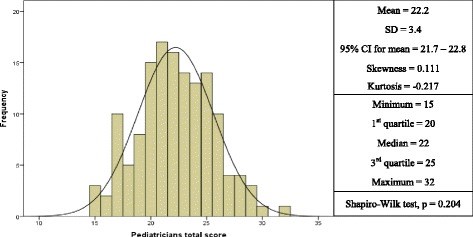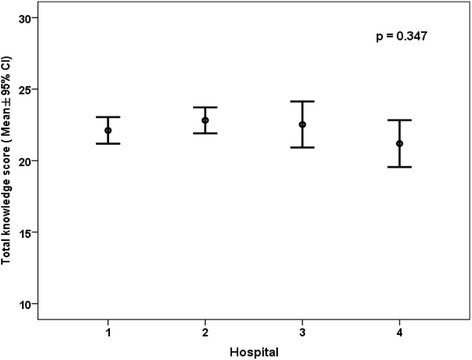Awareness of food allergies: a survey of pediatricians in Kuwait
Affiliations
Affiliations
- Department of Pediatrics, Faculty of Medicine, Kuwait University, P.O. Box: 24923, Safat, 13110, Kuwait city, Kuwait. wemh@hotmail.com.
- Allergy and Clinical Immunology Unit, Department of Pediatrics, Al-Sabah Hospital, Kuwait City, Kuwait. wemh@hotmail.com.
- Gastroenterology Unit, Department of Pediatrics, Al-Ameri Hospital, Kuwait City, Kuwait.
- Allergy and Clinical Immunology Unit, Department of Pediatrics, Mubarak Hospital, Kuwait City, Kuwait.
- Department of Community Medicine & Behavioral Sciences, Faculty of Medicine, Kuwait University, Kuwait City, Kuwait.
- Gastroenterology Unit, Department of Pediatrics, Adan Hospital, Kuwait City, Kuwait.
Abstract
Background: Early diagnosis of food allergies (FA) is important for a favorable prognosis. This study aimed to determine the level of awareness of FA among pediatricians in Kuwait.
Method: A 43-item self-administered questionnaire was designed and distributed to pediatricians working at 4 government hospitals in Kuwait.
Results: A total of 140 pediatricians completed the questionnaire, with a participation rate of 51.1% (81 males and 59 females). The mean age of participants was 40.81 years, and the mean number of years working in pediatrics was 13.94 years. The mean overall knowledge score was 22.2. The pediatricians' overall knowledge scores were found to be significantly associated with their age (older pediatricians had higher overall scores) and years of experience as a pediatrician but were independent from hospital site, gender, or rank. A multiple linear regression revealed pediatrician age and gender were the only variables that were significantly associated with the overall knowledge score. Only 16.4% of the participants answered at least 2/3 of the survey questions correctly. The questions that were correctly answered by ≤ 2/3 of the participants constituted 80% of clinical presentation questions, 66.6% of diagnostics questions, 77.7% of treatment questions, and 42.8% of prevention questions. Interestingly, among 68 pediatricians (48.5%) who determined that they felt comfortable evaluating and treating patients with FA, only 12 (17.6%) passed the questionnaire.
Conclusions: This survey demonstrates that there is a noteworthy deficiency of pediatricians' awareness about FA. The implementation of strategies to improve pediatricians' awareness is critical to diagnose food allergy patients early and improve their health and outcomes.
Keywords: Diagnosis; Epidemiology; Food allergy; Knowledge; Survey.
Figures
Similar articles
Primary immunodeficiency disorders: survey of pediatricians in Kuwait.
Al-Herz W, Zainal ME, Salama M, Al-Ateeqi W, Husain K, Abdul-Rasoul M, Al-Mutairi B, Badawi M, Aker N, Kumar S, Al-Khayat H.J Clin Immunol. 2008 Jul;28(4):379-83. doi: 10.1007/s10875-008-9191-6. Epub 2008 Mar 19.PMID: 18351445
Brazilian pediatricians' adherence to food allergy guidelines-A cross-sectional study.
Vieira SCF, Santos VS, Franco JM, Nascimento-Filho HM, Barbosa KOESS, Lyra-Junior DP, Bastos KA, Cipolotti R, Wayhs MLC, Vieira MC, Solé D, de Morais MB, Gurgel RQ.PLoS One. 2020 Feb 24;15(2):e0229356. doi: 10.1371/journal.pone.0229356. eCollection 2020.PMID: 32092100 Free PMC article.
Diagnosis and management of food-induced anaphylaxis: a national survey of pediatricians.
Krugman SD, Chiaramonte DR, Matsui EC.Pediatrics. 2006 Sep;118(3):e554-60. doi: 10.1542/peds.2005-2906.PMID: 16950947
Pediatricians' knowledge, attitudes and experience regarding child maltreatment in Kuwait.
Al-Moosa A, Al-Shaiji J, Al-Fadhli A, Al-Bayed K, Adib SM.Child Abuse Negl. 2003 Oct;27(10):1161-78. doi: 10.1016/j.chiabu.2003.09.009.PMID: 14602097
Awareness of allergic enterocolitis among primary-care paediatricians: A web-based pilot survey.
Comberiati P, Landi M, Martelli A, Piacentini GL, Capristo C, Paiola G, Peroni DG.Allergol Immunopathol (Madr). 2016 Sep-Oct;44(5):461-6. doi: 10.1016/j.aller.2016.03.002. Epub 2016 Aug 3.PMID: 27498217
Cited by
Aljameel GM, AlSedairy SA, Binobead MA, Alhussain MH, Bin Obaid MA, Al-Harbi LN, Alshammari GM, Arzoo S.Healthcare (Basel). 2023 Apr 28;11(9):1259. doi: 10.3390/healthcare11091259.PMID: 37174801 Free PMC article.
Food allergies and allergens in Lebanon: Characterization and perceptions toward labeling.
Elrahi B, Mehanna Z, Haidar S, Serhan M, Hassan HF.World Allergy Organ J. 2023 Jan 20;16(2):100743. doi: 10.1016/j.waojou.2023.100743. eCollection 2023 Feb.PMID: 36743384 Free PMC article.
Alhuzimi TE, Alharbi MH.Children (Basel). 2022 Dec 26;10(1):48. doi: 10.3390/children10010048.PMID: 36670599 Free PMC article.
KMEL References
References
-
- Wilson BG, Cruz NV, Fiocchi A, et al. American College of Allergy, Asthma & Immunology Adverse Reactions to Food Committee. Survey of physicians’ approach to food allergy, Part 2: Allergens, diagnosis, treatment, and prevention. Ann Allergy Asthma Immunol. 2008;100(3):250–255. doi: 10.1016/S1081-1206(10)60450-4. - DOI - PubMed

